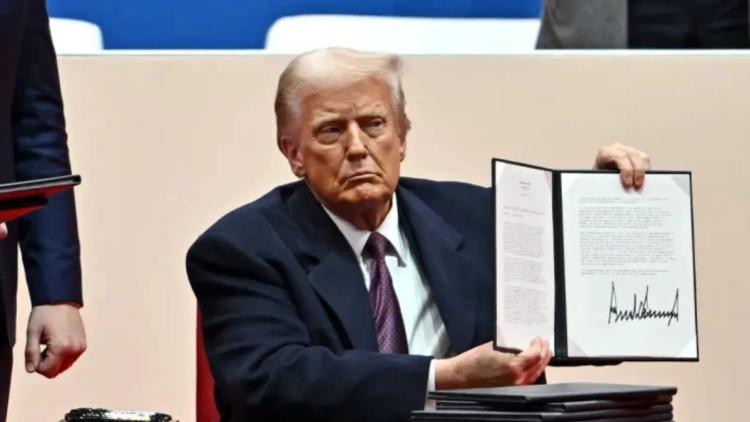U.S. President Donald Trump’s recent warning that he might intervene militarily in Nigeria to stop what he described as the “mass killing of Christians” has reignited global debate about the country’s security situation and religious tensions.
For months, several U.S. politicians and advocacy groups have accused Islamist militants of deliberately targeting Christians in Nigeria. However, a BBC investigation reveals that much of the data driving these claims is difficult to verify and often inconsistent.

Claims and Counterclaims
Some U.S. figures, including Senator Ted Cruz, have cited alarming statistics suggesting that tens of thousands of Christians have been massacred and thousands of churches destroyed since 2009. Popular American host Bill Maher even referred to the situation as a “genocide,” claiming that Boko Haram and other jihadist groups have killed over 100,000 people and burned 18,000 churches.
The Nigerian government has firmly rejected these figures, calling them “a gross misrepresentation of reality.” Officials insist that terrorist groups attack people of all faiths — Christians, Muslims, and others — who reject their extremist ideology.
Security analysts in Nigeria agree that while Christians have suffered from extremist violence, the claim of a targeted genocide against them lacks solid evidence. Many experts emphasize that Nigeria’s multiple security crises — including insurgency, banditry, and ethnic conflict — are complex and not purely religious.
The Source of the Controversy
Much of the U.S. political narrative relies on data from the International Society for Civil Liberties and Rule of Law (InterSociety), a Nigerian NGO that tracks human rights violations. In its 2025 report, InterSociety claimed over 100,000 Christians and 60,000 “moderate Muslims” have been killed since 2009.
However, researchers say the group’s methodology lacks transparency. Its reports combine previous estimates, media coverage, and undisclosed eyewitness accounts, making independent verification nearly impossible.

When the BBC analyzed 70 of the media sources cited by InterSociety for 2025 alone, it found that many did not specify the victims’ religion — and the total number of deaths was closer to 3,000, not 7,000 as the group reported.
Who Is Behind the Killings?
Nigeria’s violence stems from multiple armed groups. Boko Haram and Islamic State West Africa Province (ISWAP) have waged jihadist campaigns mainly in the Muslim-majority northeast. However, other armed actors, such as Fulani herders and bandits, also contribute to the bloodshed.
InterSociety labels Fulani herders as “jihadists,” but many experts reject this. Analysts argue the herder-farmer conflicts are largely about land, resources, and ethnic rivalry, not religion. Both Christian and Muslim communities have suffered from these attacks.
Security experts like Confidence McHarry from SBM Intelligence explain that while such violence may take on a religious tone when churches or mosques are attacked, its roots are often economic and territorial, not ideological.

Other Research Findings
Alternative data sources like the Armed Conflict Location & Event Data Project (ACLED) present a different picture. ACLED’s records show around 53,000 civilian deaths from all political violence in Nigeria since 2009, involving both Christians and Muslims.
Between 2020 and 2025, ACLED identified 384 attacks targeting Christians, resulting in 317 deaths — a small fraction of the total civilian toll.
Similarly, Open Doors, a global Christian advocacy group, reported that 3,100 Christians and 2,320 Muslims were killed between October 2023 and October 2024 — indicating that the violence affects multiple religious communities.
Political and Global Reactions
U.S. lawmakers like Senator Cruz have used the issue to criticize Nigeria’s handling of insecurity, accusing the government of ignoring Christian persecution. Trump echoed these sentiments, calling Nigeria a “disgraced country” that “allows the killing of Christians.”
Nigeria has rejected such accusations but acknowledged ongoing security challenges. Officials say they are open to foreign assistance against terrorism — provided it respects the country’s sovereignty.
Some observers believe separatist groups like the Indigenous People of Biafra (IPOB) and the Biafra Republic Government in Exile (BRGIE) may have helped amplify the “Christian genocide” narrative in U.S. political circles through lobbying efforts.
While Christians in Nigeria have undeniably faced deadly attacks from extremists, evidence suggests that Muslims and other groups have suffered in nearly equal measure. The country’s insecurity crisis is deeply rooted in terrorism, poverty, and governance failures — not purely religious persecution.
Analysts warn that framing Nigeria’s violence as a “Christian genocide” risks oversimplifying a complex national tragedy and could further inflame divisions in an already volatile region.




